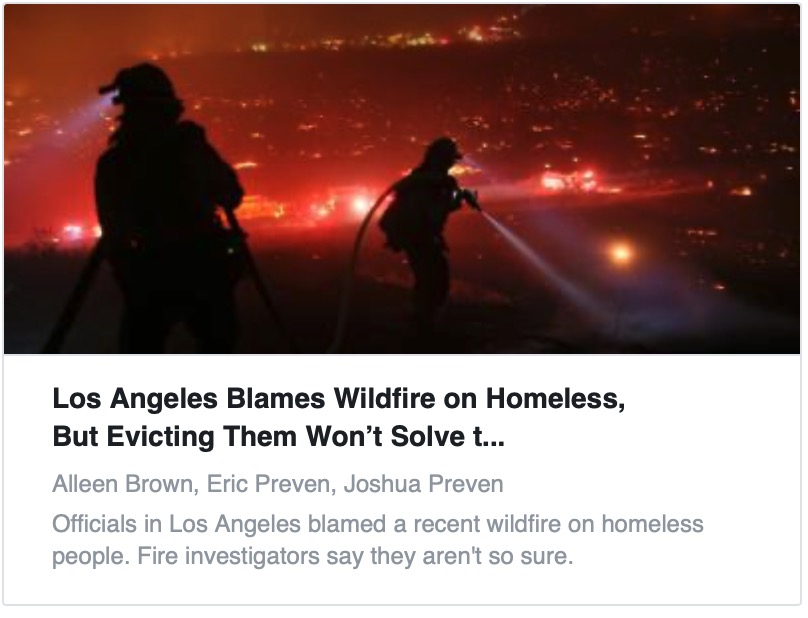Comments
ERIC PREVEN’S NOTEBOOK - Barger’s decision to open public comment just 17 minutes into the meeting—was it a genuine gesture or a strategic nod to a well-prepared STEM crowd? The STEM City enthusiasts got their moment, alongside county leadership right up front, as "Big Money Griff" made a formal introduction to Lindsey Horvath, the county's new media star!
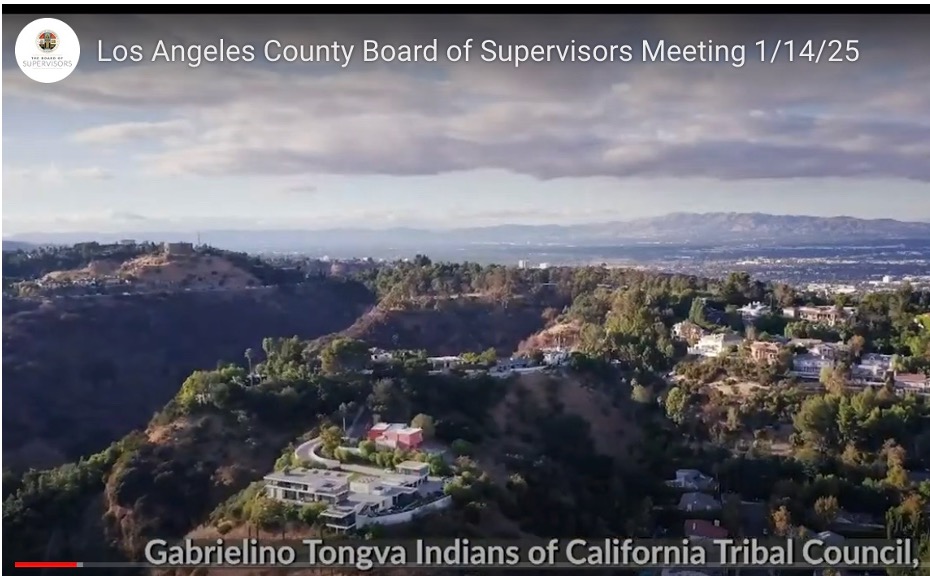
Quickly, Supervisor, could the mansion below be in a High Fire Severity zone...?
A decade of STEM success and their flagship space center claims to produce more engineers than anywhere else. Bold, but what caught my ear was their planned April 12th event at Exposition Park, in partnership with the LA Public Library. Promising.
Speaking of Exposition Park, if George Lucas ever wants to lunch in this town again, that museum better be free. The Autry is—until Monday. Why the cutoff? Free museums, rich people. That includes you, Lucas. No choice.
In 2017, the LA City Council unanimously approved the $1.5 billion Lucas Museum of Narrative Art. Co-founded by Lucas and Mellody Hobson, led by CEO Sandra Jackson-Dumont, and designed by Ma Yansong, the museum was set to open in 2023. Now it’s 2026. Another three-year extension. It better be free.
Sadly, we knew… or should have known
The devastation of the Palisades and Eaton fires in 2025—the destruction, lost homes, environmental ruin—was entirely predictable. The Intercept warned us [Disclosure: my brother and I collaborated on the award winning article.] Scientists warned us. We warned ourselves. But instead of action, we got blame-shifting and reactionary policies.
We should have known:
- Climate Change Fuels the Inferno – Longer droughts, record-breaking heat, and relentless winds have turned fire season into a year-round crisis. Experts sounded the alarm. We ignored it.
- Luxury Sprawl into Fire Zones – Developers kept pushing homes into high-risk canyons, prioritizing profit over fire safety. Instead of stopping it, we subsidized it.
- Defunded Prevention, Overfunded Cleanup – Controlled burns and vegetation management work, yet we poured billions into firefighting after the fact while starving prevention efforts.
- Blaming the Homeless, Ignoring the Housing Crisis – Like the 2017 Skirball Fire, officials rushed to scapegoat encampments while the real culprit—a broken housing market—went unchecked.
- Utilities Escape, Small Suspects Get Punished – PG&E and SoCal Edison settle their way out of accountability while public officials fixate on encampments or convenient scapegoats.
- Evacuation Chaos Was Inevitable – We’ve built in fire-prone zones without escape routes. How many more gridlocked, smoke-choked disasters will it take before we rethink development policies?
This city and county had every chance to act. Instead, we’re here—again. Homes lost. Air thick with smoke. Press conferences are filled with hollow promises. If we don’t demand real change, we’ll be back here in a year or two, watching another wildfire rip through another community that should never have been built.
We need leadership that takes responsibility—not just for firefighting, but for fixing the broken systems that fuel these disasters. We need prevention, not just cleanup. Accountability, not scapegoats. And we need it now.
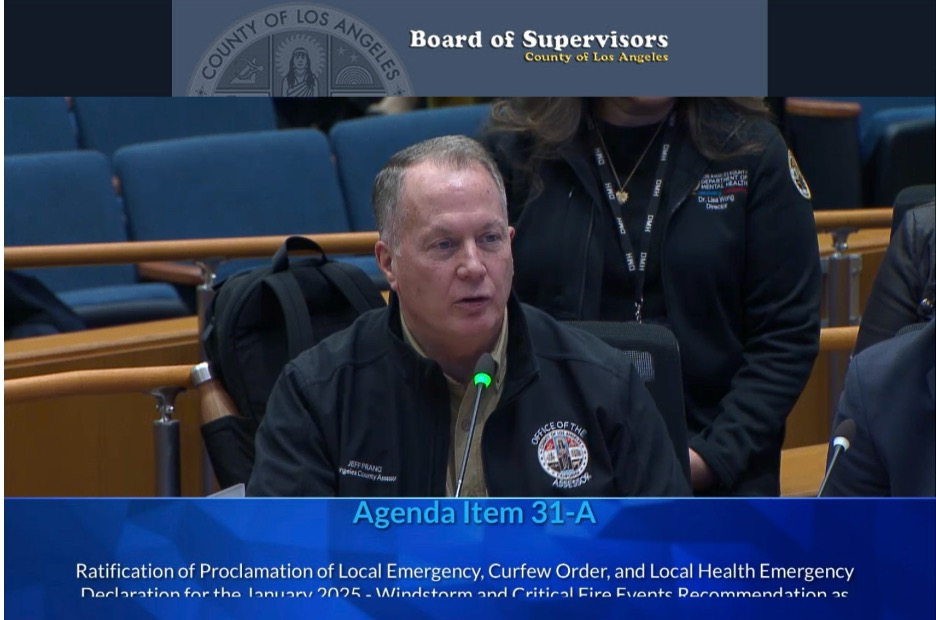
Assessor Jeffrey Prang, among the first responders.
Measure G: The Illusion of Reform
Measure G passed, and with it, L.A. is sprinting toward a political mirage—a bigger county board sold as better representation. But let’s be real: this isn’t reform; it’s a bureaucratic land grab dressed up as democracy.
The fundamental flaw isn’t just more politicians—it’s the creeping embrace of proportional representation, a system that fractures governance rather than fixes it. Advocates say more voices mean better outcomes, but history tells a different story: fragmented councils, endless coalition gridlock, and tiny factions wielding outsized power. See: Israel, Italy, Belgium.
Instead of broad-based coalition-building, we’ll get micro-parties, niche fiefdoms, and a mess of electeds who answer to hyper-local interests, not the city. More seats mean more patronage, more backroom deals, and a more tangled web of influence-peddling.
And voters weren’t exactly clamoring for this. Measure G scraped by with 51.62%—hardly a ringing endorsement. It’s part of a broader trend: county measures passing despite deep skepticism. This isn’t a mandate; it’s exhaustion.
The idea that reconfiguring the chessboard will fix governance is a fantasy. L.A. doesn’t need more county board seats. It needs accountability. Expanding dysfunction doesn’t solve it—it just gives more players a turn at the trough.
Moderator: Thank you, next speaker.
Executive Officer: Eric Preven, your line is open.
Smart Speaker: Thank you, my brother and his family lost their home in the Palisades so this has been a very personal emergency and I appreciate all the first responders for all that they’ve done and tried to do. And of course, everybody lost power and I appreciate the men and women who trudge around and turn the power back on, as well. And you know, what are we supposed to do, I think the time now is to be kind to one another and don’t lose your sense of humor and… (long pause)… keep going. Keep moving. Thank you.
Moderator: Thank you, next speaker.
Executive Officer: Eric Preven, your line is open.
Smart Speaker: Thank you. And thank you to the probation…team. The chief and… it’s very very touching and beautiful that the workers, the 1,200 who are apportioned to this particular section… during a real crisis when the young people were potentially in harm's way they came back to work and the staffing levels were robust. And I think this is the best way to resolve the conflict between the various entities… it’s resolved. [Bang Gavel!] That’s what Angelenos want to do… going forward. What a great moment.. This is like the rising phoenix out of the ashes. This is… a very, very touching … I’m going to get Bill Whitaker of Sixty Minutes back here and I also think we need to commend the third district and Lindsey Horvath’s hair and makeup team because when she was bravely going online and bringing people important information she looked very good. You know, even… so thank you once again for putting together a silver lining out of absolute devastation. And thank you for coming back to work after the… [deep hibernation and holiday relaxation flex time period. ]
Smart Speaker: Is this general public comment as well or is this a particular item?
Hilda Solis: General public comment.
Smart Speaker: General public comment, okay. Well, we’re not out of the woods, yet. And hopefully, the fire emergency will be resolved today or soon. I was going to make a comment about the Olympics because I was reading an article, now. I don’t know… of course, I like the idea of rising up from the ashes, but I remain concerned that the Olympics are a priority complicator. We should maybe grab it four years later and give them back to Paris for 2028 while we rebuild. I mean I don’t want to be the naysayer. I know everybody is committed to constant megaevent programming and the safe shuttling of drunken sportsfans and other people between venues. One quick question, who will use such an elaborate shuttle system to go from stadium to stadium after the games?
Great question. Get him out of here!
Noone goes between stadiums, regularly.
Got it, thx.
Go USA! Vive La France!
Anyway, thank you for measure E… approximately 10 years too late, and I thought Chief Marrone looked fantastic on Sixty Minutes.
Marqueece Harris-Dawson’s City Hall Legacy: A Presidential Oversight
For all the energy expended on political events this past year, one thing is clear: in Los Angeles, some names will be remembered, while others will fade into the civic abyss. This brings us to Council President Marqueece Harris-Dawson, who—despite holding the gavel—seems destined for the latter category.
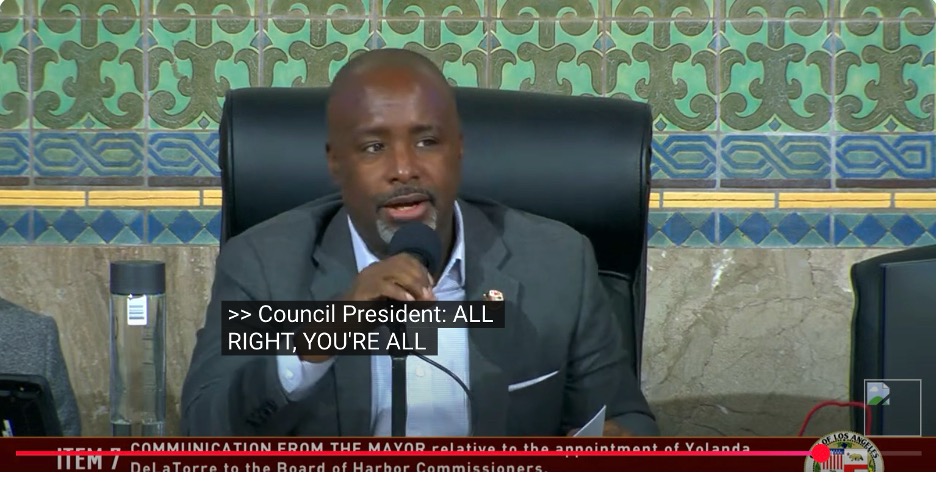
Bad President Marqueece Harris-Dawson has a very upscale single-use water bottle.
Harris-Dawson has made it a priority to erase history rather than make it. The latest case in point: his move to de-name the Herb Wesson smoking steps of City Hall while, in a seemingly unrelated item, rushing to put Danny Bakewell’s name in lights elsewhere in the city. Why? Bakewell, the longtime king of public giveaways, has been milking local politicians for years, convincing them to shower him with taxpayer funds for "advertising"—even as his annual Taste of Soul party, a street event, is held on publicly funded roads. The optics? Less than appetizing.
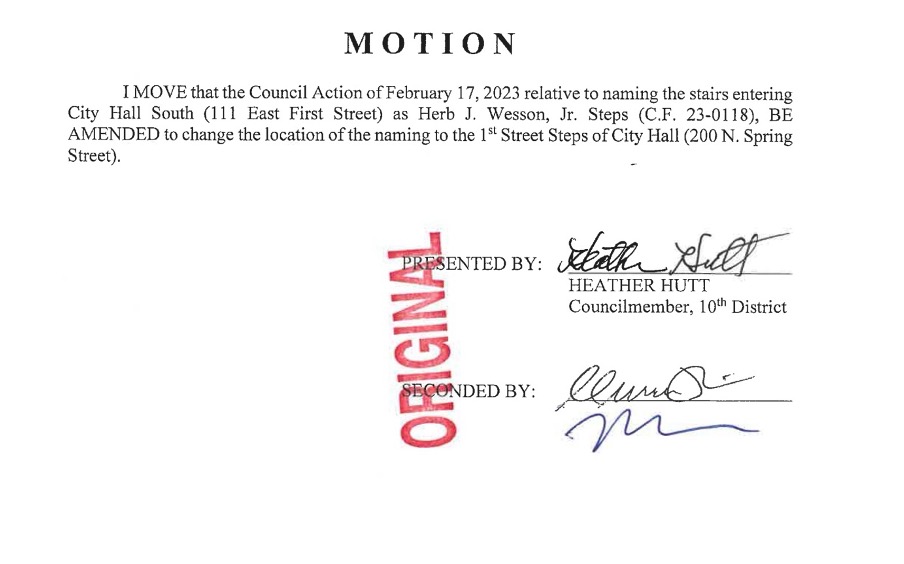
Denaming the Herb Wesson steps.
The first post-fire meeting on Tuesday was bound to be messy—charred emotions, smoky procedural maneuvers, and a thick haze of tenant rights advocacy hanging over Council Chambers. Jonathan Groat, ever the picture of efficiency, helpfully reminded those in attendance that if they wanted to see the motions, they were on the bulletin board. Why? Because with virtual comments cut out, he reasoned, there was no longer a need to announce where the public could find them. Brilliant. What a POS.
Now, for those keeping track at home, this meant that even the most devoted of civic participants—including yours truly—had to go undercover just to find out what our city leaders were about to rubber-stamp. And when I did locate the presentation document, what did I discover? One readable motion. One.
The waiver of City Council review under Charter Section 245(b) to expedite the SEA-CHANGE Project—a tidy $644 million port deal. In other words, a backroom maneuver to let an outgoing administration shove through a generationally significant land-use decision without oversight.
Charter 245(b), for those new to this particular brand of bureaucratic sorcery, allows City Council to let agency decisions sail through without review. It’s a way to bypass scrutiny under the guise of urgency, and the excuse in this case? Fear that a new administration might actually want to take a second look. If that’s the concern, just say so. But instead, we got Rule 23 shenanigans.
Rule 23 is the legislative black hole where transparency goes to die. Normally, the Brown Act requires agenda items to be posted 72 hours in advance, so the public can weigh in. Or 24 hours in advance for a Special meeting. (Hello, Fauble!) But Rule 23? That allows councilmembers to drop in last-minute motions without notice. And this week, the motions weren’t just dropped in—they were bulked up into a unreadable PDF. Not that it mattered, since public comment was pre-denied, ensuring that no one could read them, process them, or fight back.
Meanwhile, the Council was generously "afforded the opportunity" (their words) to hear an update on disaster response without opening the floor to public comment. Shameful.. Because when 61 budgeted city positions vanish into the ether and 300 disaster workers are cut, what you want is an "update," not a discussion. Not accountability.
While the public was blocked from speaking, the city’s financial faucets remained wide open. A million here, a couple hundred thousand there. Some rejected, some approved with lightning speed. And let’s not forget the biggest sleight of hand: waiving $640,000 in penalties, refunding another $892,500, and greenlighting a $1.9 million payout to the city. Who gets what? Who’s on the receiving end? No discussion.
And as the meeting closed, a familiar refrain: "We have to fundamentally change the way we do things in this city." Yes. Maybe by starting with not cutting off public testimony while shoveling out millions under an expiring administration’s watchful gaze. Maybe by not letting Rule 23 be a magic trick where public accountability disappears.
Or, at the very least, maybe by not pretending the biggest port deal in recent memory just slipped through unnoticed.
Wednesday’s City Council meeting, in the grand tradition of its predecessor snooze-fests, was yet another fusillade of rubber-stamped approvals for a series of contracts that make you wonder if anyone in the room has ever met an auditor. The absence of public call-in testimony was the cherry on top of this bureaucratic morass—no inconvenient questions, just a seamless conveyor belt of murky expenditures and political back-scratching.
Let’s start with the Apparatchiks at the Recreation and Parks (RAP) Commission. These are the same geniuses who sat idly by while Studio City’s Paul “Prop K is not for Krekorian” constructed a sprawling empire of high-school regulation basketball courts under the guise of public service. Now, they’re gleefully rolling over a stack of pre-negotiated playground contracts. Millions in playground spending—because, you know, playground stuff is always an urgent priority when the city is drowning in financial quicksand. Why are we spending $29 M to erect another High School Regulation Basketball Court in Studio City?
And speaking of rolling over, the LAPD Metro contract got a $113.9 million bump, to be precise, bringing the grand total to a cool $730 million. Because nothing says fiscal responsibility quite like pouring more money into a department that continues to be scrutinized for its hovering around the food court at Union Station checking for fare jumpers.
Next up, the Crown Castle Fiber deal. Ah, Crown Castle, the cell tower overlords who slip their infrastructure into public rights-of-way like a magician palming a coin. Given the recent uptick in catastrophic fires, maybe—just maybe—we should hit pause and confirm how much of this telecom empire's infrastructure is responsible for the latest infernos. Or we can just hand them a $24 million contract for “data communication and network services.”
And then there’s Wells Fargo Bank. That’s right—Wells Fargo, the financial institution you might remember them from such hits as “Widespread Fraud Against Their Own Customers,” “Illegal Foreclosures,” and “Opening Accounts No One Asked For.” But hey, bygones! Let’s contract for another two years, because what is institutional betrayal if not an opportunity for a fresh start? A special nod to Adrin Nazarian’s wife, who knows how to handle financial predators. Carefully.
And finally—Pétanque. That’s right, the French lawn bowling game is getting prime real estate at Cheviot Hills. Because when you think of L.A.’s most pressing recreational needs, surely an Olympic-adjacent bocce variant tops the list. And for the low, low price of $100 a year (or $150 for couples!), you too can experience the thrill of gently tossing metal balls on hard dirt.
It’s eye-hand coordination.
Finally, Wednesday’s meeting was a masterclass in prioritizing the inexplicable while ignoring the obvious. Millions for playgrounds and police, fiber contracts with questionable oversight, and a bank with the ethics of a cartoon villain getting back in the city’s good graces.
LOS ANGELES CITY COUNCIL MEETING MINUTES
Wednesday, [January 15, 2024] – 42 Minutes In
The meeting was called to order by the Council President. Roll call was taken.
Items 1 and 8 had public hearings. Items 2 through 7 required public hearings due to the cancellation of the relevant policy committees. Items 9 through 22 had no public hearings. Item 23, a closed session item, required ten votes for consideration.
A motion was made to approve the City Attorney’s recommendation on Item 23. Councilmember Yaroslavsky seconded. The recommendation was not immediately stated. Item 20 was separated. Councilmember Price recused himself on Item 1.
Public comment was announced, with speakers given one minute per item, up to three minutes total. The goal, as stated, was to get through as many speakers as possible. [Bullshit]
Herman spoke on Item 3, referencing smoking. ACT LA and LA CAN addressed housing concerns. A Metro contract discussion led to questions about fare enforcement and whether police would be present on trains. One speaker sang a song. Another referenced "Kevin in a dress." Council cut off several speakers mid-sentence. Price’s upcoming February trial was noted. At some point someone referred Hugo Soto Martinez as "Stalin". Candido received an official warning.
A CD10 Neighborhood Councilmember raised concerns over REAP, claiming half of reported violations are ignored, landlords’ receipts vanish, and grievances go unresolved. CD8 representatives echoed similar concerns, citing a lack of fair housing representation and unchecked illegal evictions. Miracle McKinney called for a rent freeze before February 1.
She got major applause!
Councilmember McCosker acknowledged Yolanda De Latorre, calling her “…very nice.”
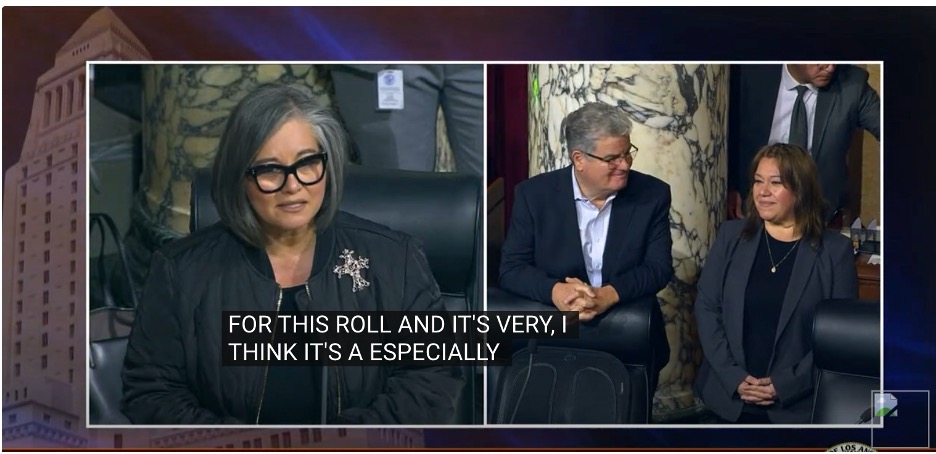
Councilmember Harris-Dawson declared Los Angeles “one of the great ports on planet Earth.” Councilmember John Lee, known as Staffer B for his role in Englander’s Vegas party, reflected on the Northridge Earthquake, praising the heroes who restored order.
The meeting was adjourned after an announcement that the next meeting was canceled. No reason was given.
(Eric Preven is a longtime community activist and is a contributor to CityWatch.)


